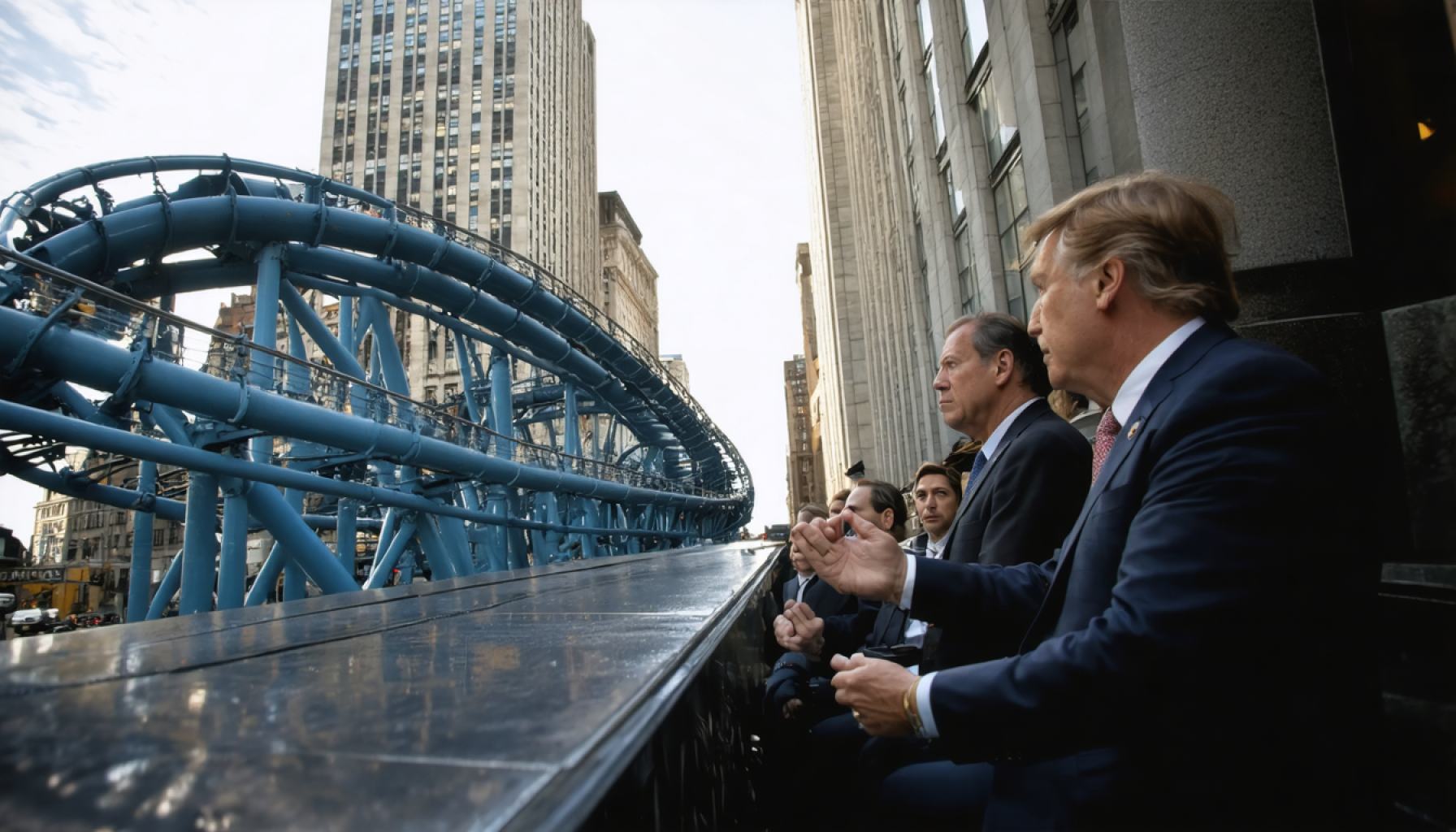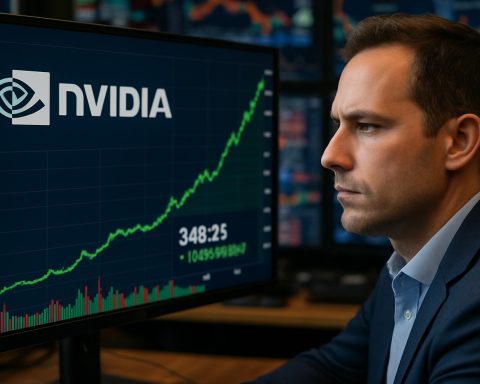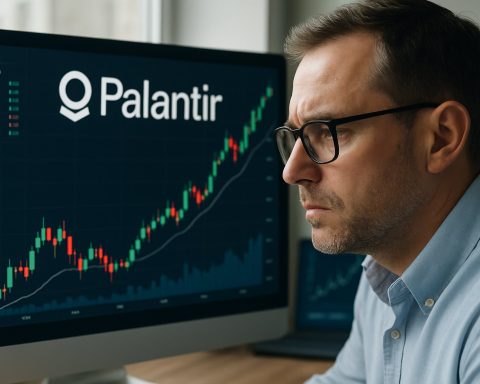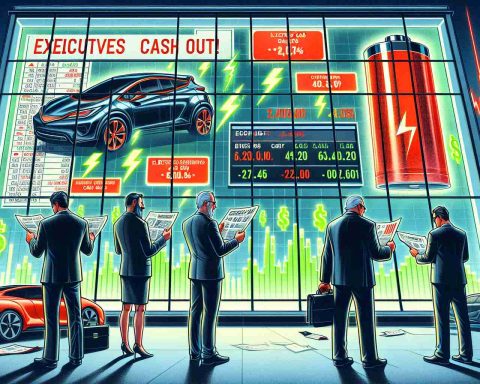- Nvidia Corp.’s stock fell 8.5% after the U.S. imposed export controls on its AI chips to China, with potential earnings impacts of $5.5 billion.
- The semiconductor sector declined by 3% due to geopolitical tensions and export restrictions.
- Banking giants and Netflix reported strong first-quarter earnings, contrasting with UnitedHealth Group’s 22.4% drop following its earnings forecast revision.
- Canada paused certain U.S. tariffs, aiding cross-border supply chains, especially for Michigan’s automakers.
- Federal Reserve Chair Jerome Powell faced criticism from President Trump over inflation and trade policy strategies.
- The European Central Bank’s aggressive rate cuts contrasted with the Fed’s cautious approach, increasing global monetary policy divergence.
- Gold surged to a record $3,330 per ounce as investors sought stability amid economic and policy uncertainties.
Within the bustling corridors of Wall Street, seasoned traders and anxious investors alike grappled with the latest economic tremors—each new ripple sending waves through the financial markets. The week closed in decline, leaving an unmistakable mark courtesy of a volatile blend of chip export restrictions and geopolitical tensions.
In an unexpected turn, Nvidia Corp., a titan in the tech industry renowned for its cutting-edge AI chips, found itself ensnared by newly imposed export controls. The U.S. government’s decision to require licenses for Nvidia’s H20 AI chips sold to China sent shockwaves rippling across the tech sector. The company warned of a potential $5.5 billion impact on its earnings, illustrating the profound economic implications of these geopolitical maneuvers. As tech stalwarts faltered, Nvidia’s stock stumbled by 8.5%, dragging the semiconductor sector down 3% in its wake.
Despite this tech turbulence, other industry players offered a glimmer of resilience. First-quarter earnings unveiled mixed results, with banking giants and the ubiquitous Netflix Inc. boasting commendable gains. However, the healthcare giant UnitedHealth Group Inc. shocked the market. Its substantial downward revision of its annual earnings forecast triggered a dramatic 22.4% plummet—its worst in over two decades—sending shivers down investors’ spines.
As if these developments weren’t enough, the broader economic landscape was further jolted by Canada’s strategic pause on certain U.S. tariffs, temporarily easing cross-border supply chains—a crucial lifeline for Michigan’s famed automakers. On the macroeconomic front, Federal Reserve Chair Jerome Powell’s warnings about inflation and growth amid ongoing trade tensions prompted an ill-tempered retort from the White House. President Donald Trump’s critique of Powell resonated loud and clear, punctuating an already turbulent market week with political strain.
Meanwhile, across the Atlantic, the European Central Bank pursued an aggressive policy shift, executing its latest in a series of rate cuts. This move highlighted the global divergence in monetary strategies and further fueled Trump’s visible dissatisfaction with the Federal Reserve’s cautionary approach to interest rates.
Amidst the flux, gold shone as a bastion of stability. Investors, wary of uncertainty and policy fluctuations, continued to drive gold prices to unprecedented heights, with bullion soaring to a record $3,330 per ounce. This relentless climb underscored gold’s enduring allure as a safe haven, rallying investors who sought refuge in its historical gossamer sheen.
The week underscored an essential truth: global finance is intricately woven into the fabric of technology, geopolitics, and policy decisions. This confluence of forces reminds us that in the world of economics, stability is often a fleeting notion, one that invites scrutiny and strategic recalibration by those who dare to navigate its complex currents.
Navigating Financial Turbulence: A Deep Dive into Market Dynamics
Understanding the Key Players and Market Dynamics
In recent weeks, the financial markets have been a whirlwind of activity, deeply influenced by the intertwining of technology advancements, geopolitical tensions, and policy decisions. The intersection of these forces reshapes not only individual companies like Nvidia but also entire sectors, creating a landscape that demands thorough understanding and strategic foresight.
Nvidia’s Predicament: Beyond the Headlines
Nvidia Corp.’s troubles stem from the U.S. government’s licensure requirements for AI chipset exports to China, specifically affecting their H20 line. This move, aimed at safeguarding national security interests, invites scrutiny over the semiconductor industry’s supply chain vulnerabilities. The company’s estimated $5.5 billion earnings shortfall highlights the critical dependence on Chinese markets for tech conglomerates.
Real-World Use Cases: AI chips like Nvidia’s H20 are essential in various applications, from autonomous vehicles to complex data-analysis tasks in industries like healthcare and finance.
Security Implications: The export restrictions are designed to prevent sensitive technologies from advancing military capabilities abroad, particularly in nations like China.
Banking on Stability: The Financial Sector’s Response
Despite the shudders in tech, banking giants have showcased resilience. Many such institutions have reported solid earnings growth, thanks to diversified portfolios and a careful navigation of international lending and investment opportunities.
Market Forecasts & Industry Trends: The banking sector is reinforcing its digital transformation, investing heavily in technology to mitigate future disruptions akin to the recent upheaval faced by tech companies.
Current Challenges: Rising interest rates and inflation continue to pose challenges, urging banks to innovate in their service offerings to maintain growth.
Healthcare in Flux: UnitedHealth’s Shocking Performance
UnitedHealth Group’s steep 22.4% stock decline following its lowered earnings outlook serves as a poignant reminder of the sector’s volatility.
Controversies & Limitations: The company’s revision raises concerns about operational inefficiencies and market saturation in key segments like Medicare Advantage, necessitating strategic overhaul.
Pros & Cons Overview: While healthcare remains a perennial human need, shifts in regulation, funding models, and population demographics continue to alter the landscape.
Global Economic Strategies: A Tale of Divergent Policies
Policy decisions also played a crucial role, with the Federal Reserve and European Central Bank (ECB) executing markedly different strategies to tackle economic growth and inflation.
Security & Sustainability: The divergent paths of interest rates in the U.S. and Europe reflect broader concerns about economic growth sustainability amidst geopolitical risks and trade tensions.
Gold: The Timeless Investment Haven
In times of sweeping economic uncertainty, many investors turn to gold, leading to its price reaching historic heights at $3,330 per ounce. This surge symbolizes both a lack of confidence in volatile equities and the enduring faith in metals as financial safeguard.
Investment Insights: Gold remains a core component of a diversified investment strategy, especially during periods of geopolitical instability or monetary policy shifts.
Actionable Recommendations
1. Diversification is Key: Investors should consider diversifying portfolios across sectors to balance risks—consider commodities, stable financial institutions, and emerging markets.
2. Stay Informed: Regularly review geopolitical developments and policy changes as these directly impact financial markets.
3. Evaluate Long-Term Trends: Focus on sustainable investments, such as those in green technologies and companies invested in digital transition, which are increasingly gaining traction.
For more insights and updates on finance and investing trends, visit Forbes or Bloomberg.
Remember, the economic landscape is constantly in flux, and staying well-informed is the best defense against market volatility.












